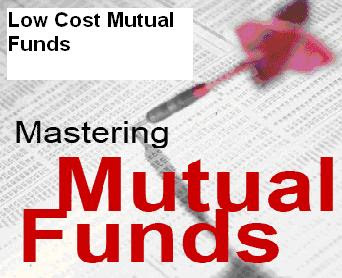
So if you invest in mutual funds, you must pay attention to fees and fund management charges. It's as simple as that -"If you can manage to save even 0.5% from your fund management fees it results in saving thousands if you stay invested over a long period of time. Hence, in this article let me discuss some Low Cost Mutual Funds, which can be used as efficient investment vehicles and provide savings in terms of low cost mutual fund fees if you decide to invest in fund for long time.
There are many such articles available on internet with the details of Low Cost Mutual Funds. In this article, I’ll attempt to put up a summary of all the available Low Cost Mutual Funds. They are selected based upon the past performance of the mutual funds over last few years.
I am putting the Low Cost Mutual Funds in the following categories:
Low Cost Mutual Funds – Index Funds:
These mutual fund offerings called Index Funds are designed to track the results of a benchmark like the Dow Jones, S&P 500 index, etc. These funds are good for investors who cannot understand the complex jargon of mutual fund prospectus and don’t have time to do research. Index funds always attempt to be with the market performance of the underlying index, hence they make good investment. Since index products are relatively static they feature little turnover that can trigger capital gains and they charge the lowest fees in the mutual-fund world.
A few good performing examples here are the Fidelity Spartan 500 index fund (FSMKX), which invests in the market's largest companies like IBM, Microsoft, GE, etc. and is a favourite for investment in 401(k) plans. For the past 10 years it has returned 7.9% annually till 2006, v/s. 8.1% for the S&P. That slight gap is due, in part, to the 0.10% expense ratio.
Another is the Vanguard Total Stock Market fund (VTSMX). It invests in 3,700 companies, giving it more exposure to potentially faster-growing smaller companies that aren't members of the S&P 500. It has returned 10.9% annually since its inception in 1992.
Low Cost Mutual Funds – Exchange Traded Funds ETF:
Though not exactly like a mutual fund, but they are similar. They more or less track the performance of the underlying index without much deviation, as trading on ETF goes on in real time on stock exchanges like any other shares.
Coming to the expenses part, the ETF equivalent of the S&P 500 - nicknamed Spiders - charges just 0.06% per year in fees; Vanguard's Total Stock Market ETF (VTI) has a 0.05% expense ratio.
Low Cost Mutual Funds – Growth Funds:
Growth Funds are those which try to achieve capital appreciation by investing in companies which utilize investors money into profitable projects. These companies do not pay regular dividends, but invest the income back into profit making projects, thereby generating growth. One of the low cost Growth Mutual Fund is Mairs & Power Growth fund (MPGFX). This fund has returned 12% annually over the last decade - four percentage points better than the S&P 500.
There's another reason why we like Frels: He's cheap -- or at least his fund is. Mairs & Power Growth doesn't whack investors with a sales charge and its annual expenses -- $7 annually for every $1,000 invested -- are half those charged by the typical domestic-equity fund. Kerry O'Boyle, who follows the fund for Morningstar, likes the patient, long-term focus. "Mairs & Power Growth has the right stuff," he wrote in a recent report on the fund. The charges are low, only $7 per $1000 invested – almost half of that charged by other mutual funds.
Low Cost Mutual Funds – Value Funds:
Value Funds are those which usually pay a lot of dividends to the investors regularly. One such Low cost Value Mutual Fund is T. Rowe Price Equity Income fund PRFDX. T. Rowe Equity Income has a dividend yield of 2.4%, about 30% higher than the yield on the S&P.
Low Cost Mutual Funds – International Mutual Funds:
Apart from the US domestic funds, the International funds from India, China, Latin America, Europe and other foreign countries are also attractive. More so, investing in international funds helps you achieve diversification. Though International Mutual Fund tend to charge more because of the administration and money transfer across the globe along with the forex risk, there are still some good funds which charges relatively less.
Dodge & Cox International Stock (DODFX), which charges a measly 0.70% expense ratio. The fund has returned 21% annually over the last five years (2006).
Hence, making an investment in a mutual fund is based upon investors preference. Selecting a Low Cost Mutual Funds to suit your needs is also important. Better to cut down on costs if you can find such a Low Cost Mutual Funds.
No comments:
Post a Comment